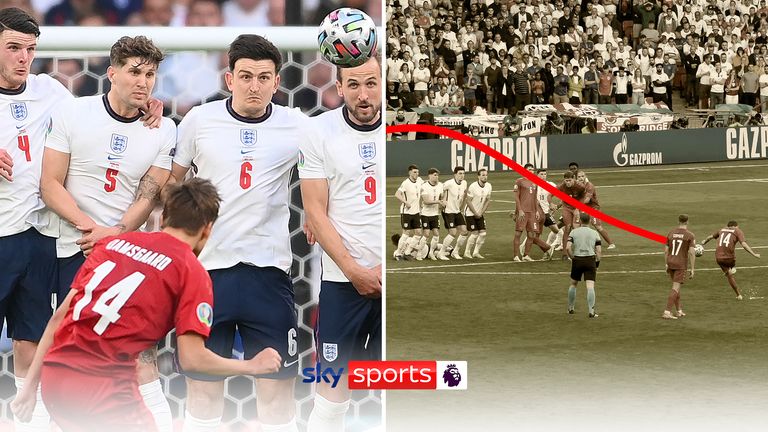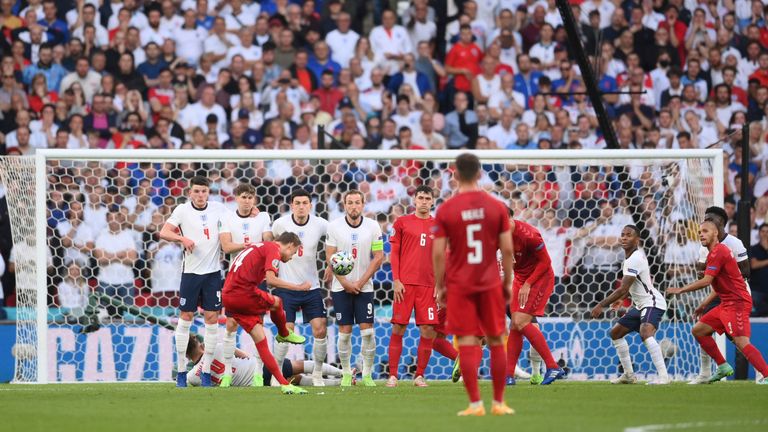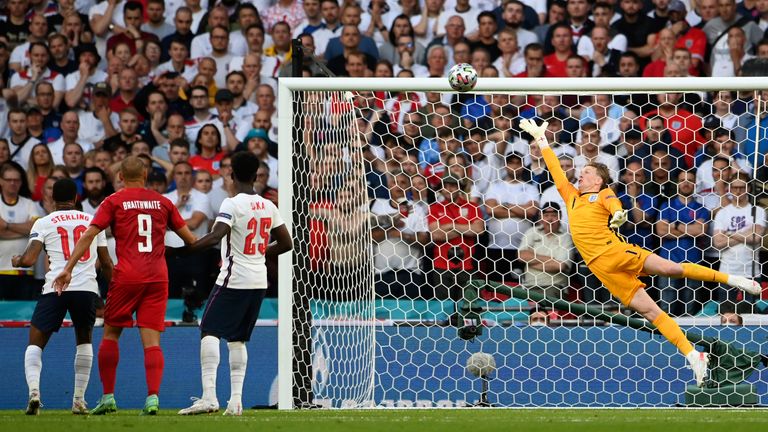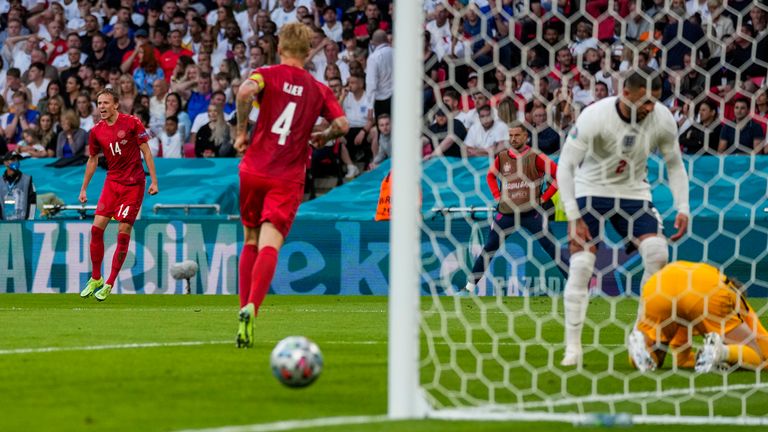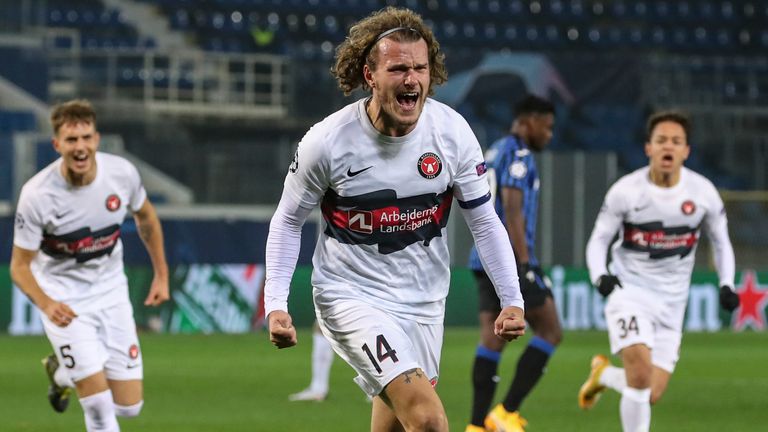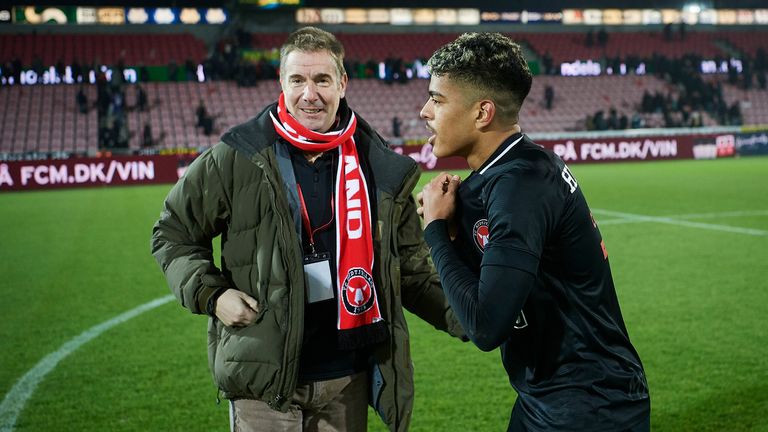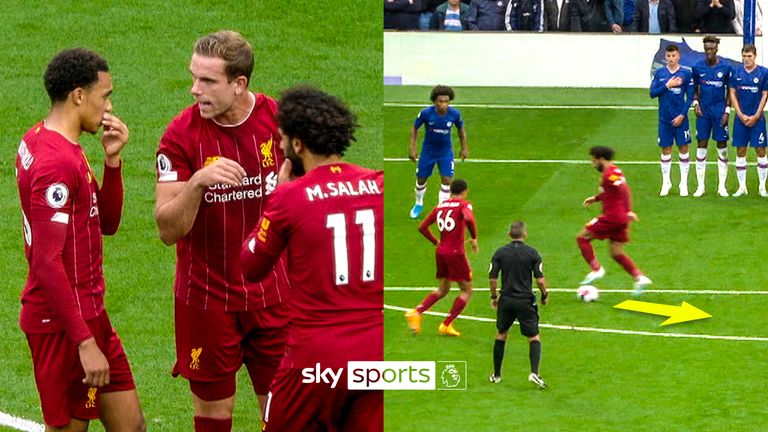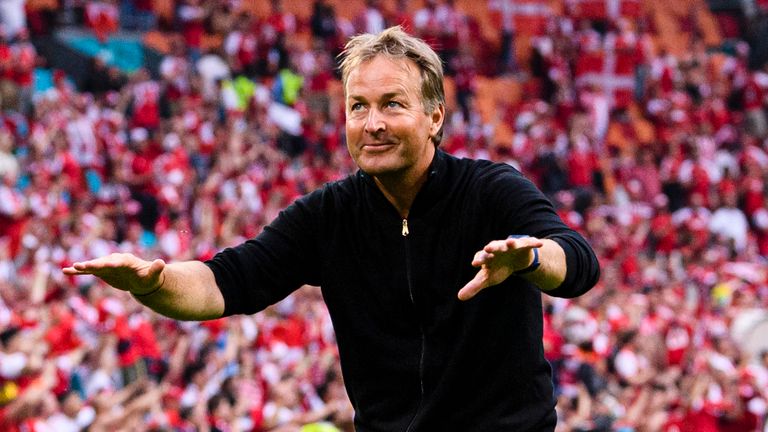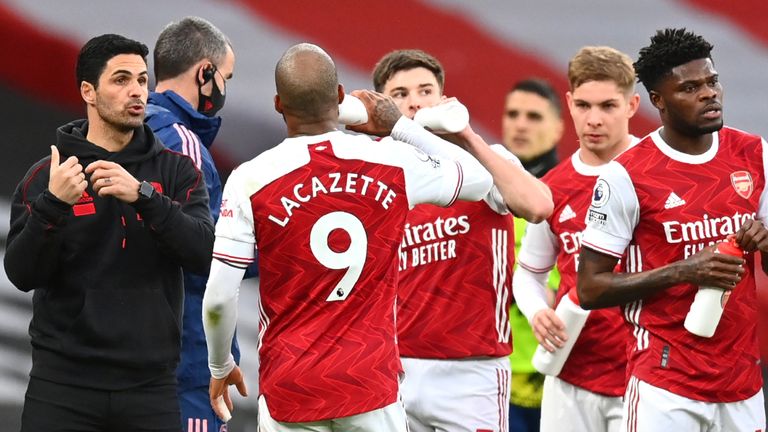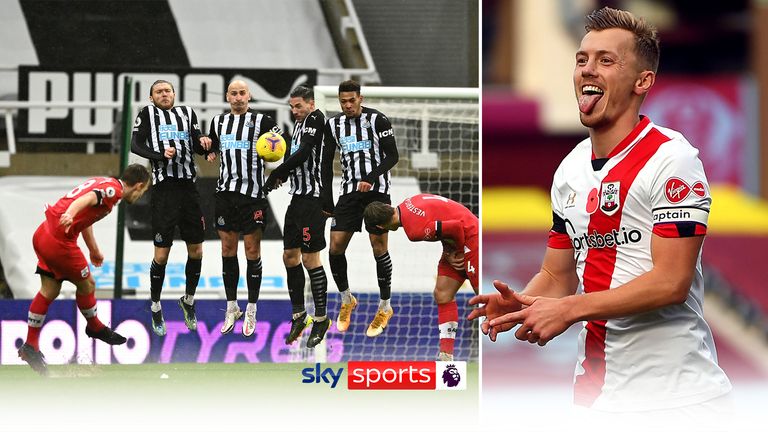Man Utd and Arsenal have hired set-piece coaches but what do they do and do they provide an edge?
Manchester United and Arsenal are among the clubs to have turned to set-piece coaches in the hope of improving their dead-ball efficiency; specialist coaching has its roots in Denmark but is becoming more popular in the pursuit of marginal gains
Friday 23 July 2021 16:10, UK
Mikkel Damsgaard's opener for Denmark against England was rated as one of the goals of the tournament at Euro 2020. The free-kick was beautifully struck, dipping under the crossbar from around 30 yards out. But there was more to it than that.
Before it was taken, centre-backs Andreas Christensen, Simon Kjaer and Jannik Vestergaard, three of Denmark's tallest players, formed their own wall a few yards to the left of England's.
There was a small gap between Christensen, the player on the end of their wall, and Harry Kane, the player on the end of England's. But as Damsgaard started his run-up, his team-mates took a step to their right, blocking Jordan Pickford's eyeline at the last moment.
Damsgaard's effort was relatively central and Pickford was criticised for failing to stop it. But in truth, there was little he could have done. The free-kick was hit with force but it was Denmark's wall that did for him. By the time the ball came back into his vision, it was too late.
- Thicker lines, armpits, handball: What's new in 2021/22
- 2021/22 season - Premier League dates and more
- Get Sky Sports | Live football on Sky Sports
The goal prompted wild celebrations among Denmark's players, fans and coaching staff inside Wembley but it was a particularly satisfying moment for Mads Buttgereit, a set-piece coach working with the Danish national side during the tournament.
"The way the guys did it - the way every single player took responsibility to help Mikkel be successful - that was maybe the biggest joy," Buttgereit tells Sky Sports.
"You can be the coach on the sidelines who makes the plan in training and has the discussions about the small details, but the players are the ones who need to do it on the pitch.
"They knew what to do, of course, but a part of that is doing it when the game is on and the stadium has 60,000 people in it. There was a lot of influence from outside and they needed to stay sharp and focused. I think that situation showed how good they are."
It also showed the value of set-piece coaching.
Set-piece specialists remain relatively rare on coaching staffs across football but gradually, that appears to be changing. Indeed, amid all the usual noise around the transfer window this summer, there have been some noteworthy moves at backroom level too.
Manchester United have hired Eric Ramsay, previously assistant coach of Chelsea's U23s, as their first set-piece specialist, while Arsenal have brought in Nicolas Jover, formerly of Manchester City, to replace their departing set-piece coach Andreas Georgson.
Ramsay has been described as an "innovative" coach with "new ideas" by Ole Gunnar Solskjaer, while Jover is well-known to Mikel Arteta having worked with him at City. "He is someone whose expertise is incredibly useful and valuable for us," said the Spaniard.
That expertise certainly proved useful at City, where Jover helped Pep Guardiola turn set-pieces from a source of weakness into one of strength following his arrival at the Etihad Stadium in 2019.
Jover is now joining a side who conceded the fewest set-piece goals in the Premier League last season, thanks in part to the work done by his predecessor, Georgson, who has returned to former club Malmo a year after becoming Arsenal's first set-piece coach.
But efficiency at the other end of the pitch remains an issue for the Gunners - they only scored six goals from set-pieces in the Premier League last season - and they are not the only ones.
In fact, set-piece goals have been in decline in the Premier League since Opta started collecting the data in 2007.
Last season, the percentage of goals scored from dead-ball situations (excluding penalties) stood at just 19.2 per cent - down from 28.5 per cent in the 2009/10 campaign and the lowest number on record.
The margin for improvement is there to be exploited.
Danish roots
One thing many set-piece coaches have in common - renowned Italian Gianni Vio as well as Jover, Georgson and Buttgereit - is that they have at some point worked under Brentford and FC Midtjylland owner Matthew Benham, a former professional gambler whose analytical, statistics-led approach to running his clubs includes an emphasis on specialist coaching.
Benham has steered Brentford from League One to the Premier League since his takeover in 2012 but it is at Midtjylland, the Danish club he has owned since 2014, that he has trialled many of his most innovative ideas - including those on maximising set-pieces.
"At Midtjylland, even before Matthew Benham came in, we were always searching for margins and asking ourselves how we could make the most of what we had," says Buttgereit, who was working in the club's youth academy at the time of Benham's takeover.
"So he didn't change the way of thinking because that mindset to always develop as much as possible was already there, but he brought a lot of data, and that was a very good combination."
Armed with Benham's data and using specialist coaching, Midtjylland stormed to their first-ever Danish Superliga title in 2014/15, their success driven by a remarkable set-piece scoring rate.
Midtjylland netted 25 times from set-pieces across their 33 games that season, accounting for 39 per cent of their overall total and putting them 14 set-piece goals clear of any other side in the division. Only three other sides even reached double figures.
Buttgereit had already developed a fascination in set-pieces by then - inspired, in part, by the 2012 Champions League final, when Bayern Munich failed to find the net from 20 corners only for Didier Drogba to equalise from Chelsea's only one of the game - and within a few years, he was in charge of Midtjylland's set-pieces.
Their methods were soon being replicated by other Danish sides, meaning they lost some of the edge their increased output from set-pieces initially gave them.
But Buttgereit and his colleagues continued to innovate, devising new routines and finding new ways to exploit their opponents' weaknesses from free kicks, corners, and even throw-ins.
"You should always be one step ahead," he says. "When you're one step ahead, you can let your opponents expect one thing, then give them something else. That is maybe even more powerful.
- Liverpool's throw-in coach explains all
- Inside football's transfer revolution
- Premier League kits for 2021/22
"If the opposition coach is telling his players, 'we know the ball is going to come to the first post, so be aware', then sometimes his players will cheat a little bit and arrive there a bit early.
"Then, if you make a different move from the one they expect, if you play it to the second post instead, for example, those defenders are of course further away. So there are a lot of mind-games to it."
Flexibility, open-mindedness and painstaking attention to detail are required too, according to Buttgereit.
"I don't just watch an opponent and say, 'OK, we're going to do this.' I watch them, I prepare a plan, then I watch them again and again and the plan develops," he says.
"You can start to doubt yourself by doing that but the closer you get to the game and the more practice you see on the pitch, the more sure you get about what is the most effective way to attack.
"You get some doubters who are used to doing things in certain ways, of course, but it's just fantastic when you see the methods being successful. After that, those players will come to you and say you were right."
Delivery is of course paramount when it comes to set-piece success but as Damsgaard's stunning goal against England showed, the actions of the players in and around the box are just as important.
"Many people will say you need to have a good delivery guy and that is true," says Buttgereit. "But you also need to have some structure and some systems which are flexible.
"It's like in football generally. You can have a coach who says, 'We have the best 11 players, so just put the ball in and play, we just need to keep them motivated.' Or you can have a coach with a clear vision for how he wants to do things.
"Often, you have the assistant coach taking set-pieces. That's one way to do it but many assistant coaches don't have real passion for set-pieces and that is maybe the reason why there is such a big difference in terms of success in different clubs."
There are of course examples of clubs becoming efficient from set-pieces without a dedicated coach on their staff - but few have done it without the passion Buttgereit speaks of.
West Ham, for instance, enjoyed great success in the field last season, scoring more set-piece goals than any other Premier League side (16) while conceding the third-fewest (seven), thanks to the work of assistant coaches Paul Nevin and Kevin Nolan.
But Nolan, although not a dedicated set-piece coach, was a set-piece specialist as a player, his dead-ball expertise - and indeed his passion - stemming from the time he spent playing for Sam Allardyce's Bolton side, whose persistent overachievement owed a lot to their potency from set-plays.
Like the work of Nevin and Nolan at West Ham, that of a specialised set-piece coach focuses as much on defending as it does attacking.
"If you score a lot of goals from set-pieces but you concede a lot as well, then for me it's a waste of time," says Buttgereit. "At the Euros with Denmark, for example, we scored twice from set-pieces but we also didn't concede any set-piece goals. That's the basics.
"It's not that one way of defending - zonally or man-to-man - is the right way to do it. You can defend successfully in a lot of different ways.
"It just depends on your players. What suits them best? What do they like the most? You need to talk to them, take their feedback on board, then find some kind of agreement."
Video analysis is fundamental too.
"Of course, you try to predict your opponent and then prepare your own players for that," adds Buttgereit. "That's another part of it. But the other thing is educating them defensively.
"If you look at some players defending set-pieces, you see they just stand waiting for the ball. You also see others who are jumping on their toes all the time, but who are still not really ready.
"For me, it's about body position, it's about how the player scans the area around them and their opponent, and how fast they react. Those are the areas in which you have to educate them.
"For example, you have to watch the last 50 corners you have faced with a specific player standing in a certain position, then you can give that player feedback. You need to show them exactly what you are talking about, so they can understand."
A question of culture
Buttgereit sees "huge potential" for dead-ball improvement across top-level football but he is eager to emphasise that hiring a set-piece coach is not in itself a guaranteed solution.
"It's not just about one head coach coming in with the idea to bring in a set-piece specialist and thinking, 'We'll bring them in and everything will be fine and we will have the margins.'
"That's not the way you should think. If you want to become great at set-pieces, then it's a question of team spirit, it's something for the whole staff and everyone at the club. They all need to buy into it.
"Sometimes it can feel like clubs are hiring somebody to solve the problem on their own but it's still the responsibility of everybody to make it work.
"I've had offers and talked to clubs looking to bring in a set-piece coach where I could feel that they weren't really ready. When I asked what it would actually look like, they didn't quite have the answers.
"For me, in those situations, it's pretty simple. There are some things I would like to do and some things I know aren't a good idea.
"For example, I don't think the best solution is that you have a specialist who just comes in once or twice a week, because building a good set-piece team is also about relationships with the players. You need to understand them and be tight with them."
It is also a question of club culture. Buttgereit puts Midtjylland's remarkable success from set-pieces down to the fact that the entire club, from academy level through to the first-team, has adopted the same focus, independent of the wishes of the head coach.
"Most clubs, the way they do it is that the head coach decides what he wants to do," says Buttgereit. "So it's the head coach who decides whether to have a specialist or not.
"At Midtjylland, it's not the choice of the head coach, it's just the strategy of the club. So when I was coaching in the academy, I started by building up set-piece takers in the U14s and U15s.
"I would do extra training with the best hitters we had. For example, we would practice taking Olimpico corners, where you try to score direct from a corner. It was fun, we would compete against each other, but it was also practice.
"Then, when I moved up to the higher age groups, it became more systematic. Every week, working with smaller groups on set-piece delivery and hitting.
"In that way, we were educating and developing the players on the technical skills they needed because it cannot be that you lose your best set-piece taker at first-team level and then your work becomes worthless. You need to have more in the pipeline."
Buttgereit attributes declining numbers of set-piece goals partly to improved goalkeeping but more significantly to a dearth of top-quality takers. He mentions James Ward-Prowse as one and Denmark duo Robert Skov and Damsgaard as others. "But then," he says, "it starts to get hard to find the good shooters."
He points out that Damsgaard's strike against England was the only direct free-kick goal at Euro 2020 and insists the importance of technique is too often overlooked.
"If I was to go into a new club, for sure I would try to teach the top-spin technique on free kicks instead of side-spin," he says. "You would then have fewer balls going into the wall or over the bar because the top-spinner moves up and then dips again.
"It's a difficult technique to learn and maybe that's why there aren't so many who can do it. At Midtjylland, though, there are players who are very, very good at it, and that's because they have practiced it from the youth all the way up to the first-team."
It is another reminder of the importance of patience and perseverance when it comes to set-piece improvement but those two qualities are in short supply in modern-day football.
Jover, for example, has already found his role coming under scrutiny from some Arsenal supporters after the side conceded three goals from corners in their first two pre-season friendlies.
"If that's the response, it's because they don't understand the mechanisms of it," says Buttgereit.
"It's not an instant fix. Arsenal and Manchester United will not suddenly become better at set-pieces if the people around Nicolas Jover and Eric Ramsay don't buy into it. They need to help them and they need to be patient, to give them a chance to do a lot of things.
"With Denmark, at the tournament we just had, we would not have been successful from set-pieces if all the coaches and players had not supported what we did and the way we practiced."
It is just another lesson for those seeking to emulate them.

